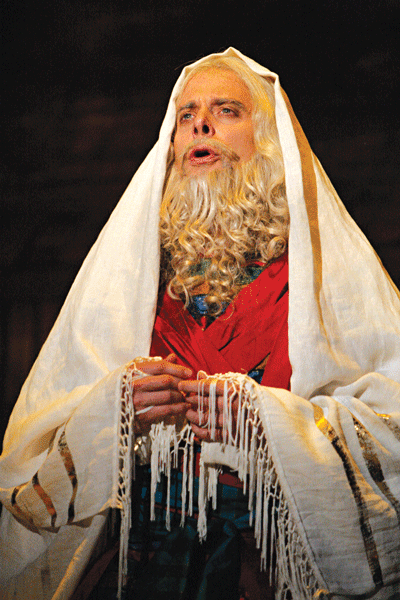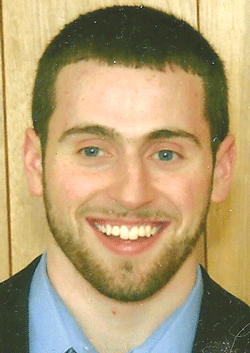Josh Kowitz, son of Cantor Mitchell Kowitz and playwright Jenna Zark, makes his professional operatic debut in this story of the conquest of Judea
By DORIS RUBENSTEIN
“By the rivers of Babylon, we dwelled and we wept” is the opening phrase of Psalm 137. For local opera lovers, it could be said, “By the waters of the Mississippi, we dwelled and we thrilled” to the Minnesota Opera’s production of Verdi’s Nabucco.
Artistic Director Dale Johnson could not have made a more appropriate choice to celebrate the opening of the Minnesota Opera’s golden anniversary season. Nabucco is an opus of epic proportions, and the company did it right — not skimping on anything, from the talent to the costumes to the scenery.
Nabucco is actually two stories tied together: the story of the conquest of Judea and the destruction of the First Temple in 587 B.C.E. by the Assyrian king Nebuchadnezzar/Nabucco, portrayed by baritone Jason Howard; and the vengeful love triangle of the Judean soldier Ismaele (John Robert Lindsey) and Nabucco’s daughters, Abigaille (Brenda Harris) and Fenena (Victoria Vargas).
In this case, the two stories are encased as a play within a play being watched by a silent audience in the 1800s, Verdi’s era, complete with costumed dancers who performed during some scene breaks — an entertaining way to celebrate opera on this anniversary occasion.

John Relyea as Zaccaria the High Priest in the Minnesota Opera’s production of Nabucco. (Photo: Courtesy of the Minnesota Opera)
While Harris is the better-established diva of the two lead sopranos, it was Vargas who received the more enthusiastic applause at the curtain call. Both their performances were excellent, but the casting of Lindsey as their love interest is somewhat regrettable; while Lindsey is a fine tenor, his slight frame is a physical misfit next to two women of “Brunhildish” proportions.
When casting the role of Zaccaria the High Priest, the choice of John Relyea was right on the money. His towering height and rich bass voice lend him the authority needed for such a demanding role. This was particularly true in his touching third act aria, praying — draped in his tallit — by the waters of the Euphrates for his people’s return to their homeland “on golden wings.”
One may wonder about Verdi’s familiarity with Jewish liturgical music. As a longtime member of the Temple of Aaron choir, I occasionally thought I heard snippets of traditional melodies, particularly in the cello introduction to Zaccaria’s prayer. Was that the first part of Kol Nidre? Such plaintive notes resounded here and there among the music sung by the exiled Jews.
Many in the audience waited patiently for the famous chorus of the Hebrew slaves, “Va, pensiero” in the third act. They were not disappointed.
In all of the many choral songs, there was a face in the crowd that should be familiar to many in the east metro: baritone Joshua Kowitz making his operatic debut. Kowitz, the son of Cantor Mitchell Kowitz and playwright Jenna Zark, graduated from Roseville High School in 2007, and received a double major B.A. in vocal performance and theater from Lawrence University this year. He was selected to be one of 35 chorus members from among hundreds who auditioned for this opportunity to sing professionally.

Joshua Kowitz
Kowitz is well prepared for Nabucco. At Lawrence, he was a principal singer in Smetana’s Bartered Bride and sang the role of Paris in Roméo et Juliette by Gounod. As part of his participation in the highly selective “Young Artists Program,” he spent a semester in Italy and performed in Nova Feltria and San Marino.
Prior to Nabucco, Kowitz had never seen a production by the Minnesota Opera, but he finds working with the company to be a ton of fun. He thinks it thrilling to learn how operas are produced on the professional fast track.
“I admire the principal singers,” he said. “And it’s wonderful to know that the Minnesota Opera promotes its singers from within.”
Despite this kind of incentive to remain close to home with the Minnesota Opera, Kowitz has other professional plans.
“I’m still determined to be a cantor, but it would be great to freelance singing opera from time to time,” he admitted.
Kowitz is the only Jew in the entire company of Nabucco. When asked if he was called upon or offered himself as a source of advice on anything Jewish, he replied that he indeed had spoken to Stage Director Joel Ivany about that possibility, but his help was never requested.
Clearly, costume designer Mattie Ullrich and scenic designer Thaddeus Strassberger knew what they were doing in setting an accurate historical atmosphere of both Solomon’s Temple and the Hanging Gardens of Babylon. The garb and props used by the Hebrews were appropriate: Zaccaria wears a bejeweled breastplate and dons a tallit in prayer; and Judean soldiers carry large shofars to call their comrades to battle against the Assyrians. Strassberger uses screens and scrims to fool the eye into believing that we are looking upon vast monuments of religious and imperial architecture.
The last scene of Nabucco sees all of the principal characters calling upon the God of the Hebrews as the only one to save them from tragedy. For AJW readers, this should bring a smile to our lips. It should motivate us to see this famous opera for art’s sake as well.
Nabucco is playing at the Ordway Center for the Performing Arts through Sept. 30.
(American Jewish World, 9.28.12)



















